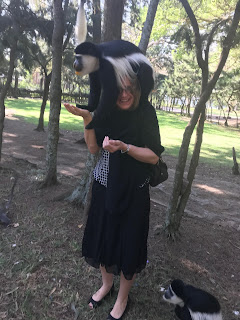I had to leave for a flight to Bahar Dar at 5 am the next morning and hoped it would just pass. At 2 am I woke up feeling worse but not bad enough to cancel the trip. I couldn't sleep and wondered what I should do. I prayed and asked God to help make the decision clear.
He answered. Loudly. And quickly. Within an hour, I had a rising fever, vomiting, and the runs.
No question about the trip now. I made the decision to cancel.
Six miserable hours later, I thanked God for His answer and reminded Him that I had canceled the trip so He could let up on the symptoms. He did. A bit.
Turned out to be malaria that I likely picked up in Kenya. While I lived in Kenya, I didn't contract malaria even one time because of the high elevation (mosquitos and malaria don't mix in high elevations - the same is true in Addis Ababa where malaria is quite rare). But it seems that malaria is adapting and it is becoming more common in higher elevations as well. And I didn't take anti-malarials while on this trip at all. My son has chided me and told me that I'm grounded from going to Africa for a year. Point taken.
BUT here is why I'm writing this blog. When I get sick in Africa, it seems to trigger immediate and anxious reactions for some family and friends. There is for a good reason - because of the death of Bob. His death was quick, without warning, and to this day, without explanation. When that happens, one loses confidence in the system to diagnose and treat, as well as in illnesses that can appear minor (as Bob's did) but can take a loved one's life within hours.
And so when I get sick, I know that it triggers fear, especially for Michael, Hannah, and Noah.
And I feel bad about that. Michael put messages on Facebook asking for prayers, and the number of comments he received was pretty remarkable. We felt loved, supported, and covered in prayer. And I have a feeling its because people know that there is probably fear and anxiety for all of us under the surface...again, for good reason.
How I wish we had a cause for Bob's death. How I wish we could understand it. Not just for his sake but for my other loved one's sake, as I continue to put them through the fear of me getting sick while I work in various parts of Africa. Even on this trip home, as I pondered my own illness, I came up with a couple more theories about Bob's death and researched them (fruitlessly). It's a question that my mind wants to be answered but to no avail.
Until then, we are reminded of Heidelberg Catechism Q&A#1, which is particularly poingant on this Easter weekend:
That I am not my own,
but belong with body and soul,
both in life and in death,
to my faithful Saviour Jesus Christ.
He has fully paid for all my sins
with his precious blood,
and has set me free
from all the power of the devil.
He also preserves me in such a way
that without the will of my heavenly Father
not a hair can fall from my head;
indeed, all things must work together
for my salvation.
Therefore, by his Holy Spirit
he also assures me
of eternal life
and makes me heartily willing and ready
from now on to live for him.










